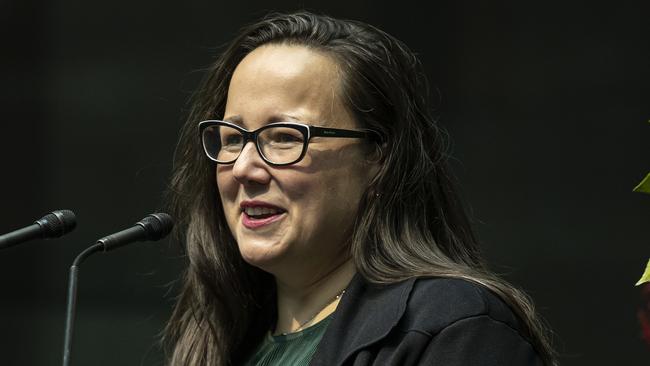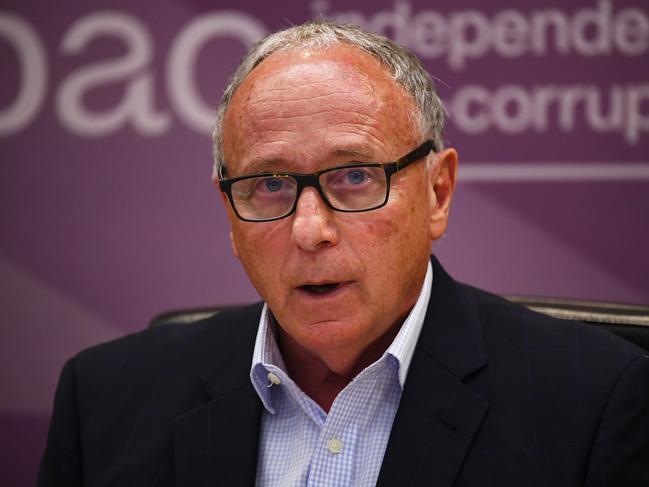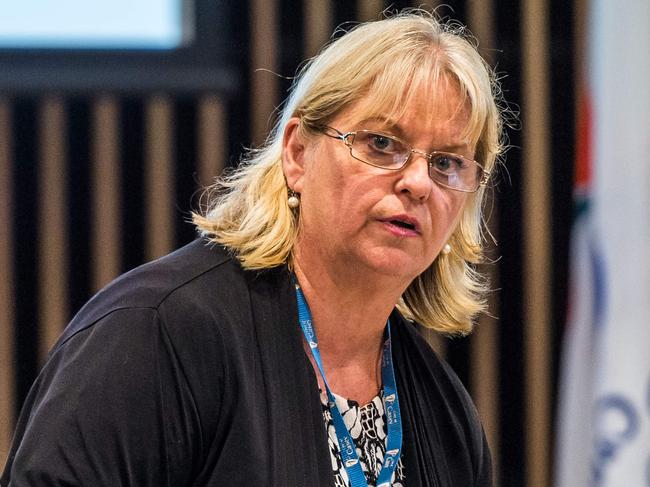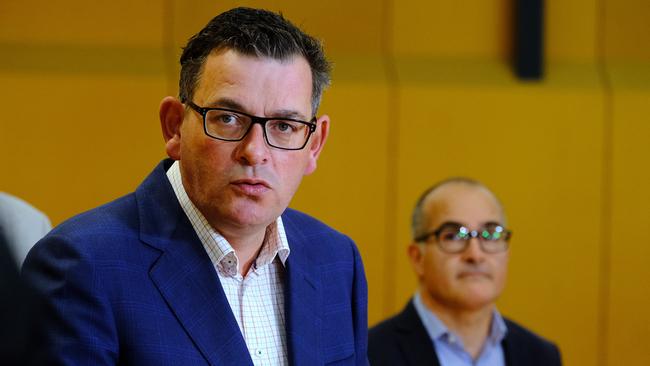Labor MP Harriet Shing ‘cut the feed’ for Daniel Andrews
A Labor MP heading an inquiry into anti-corruption agencies gagged a livestreamed hearing from discussing two secret IBAC appearances by Daniel Andrews.

A Labor MP heading a parliamentary inquiry into the treatment of witnesses by anti-corruption agencies ordered “cut the feed please”, gagging a livestreamed hearing from discussing two secret IBAC appearances by Victorian Premier Daniel Andrews.
Integrity and oversight committee (IOC) chair Harriet Shing blocked Liberal MP Kim Wells from asking about Mr Andrews’ private grilling by the Independent Broad-based Anti-corruption Commission.
Ms Shing abruptly shut down the hearing after Mr Wells asked IBAC commissioner Robert Redlich QC why the Premier was privately examined in Operation Watts and Operation Sandon rather than in public.
“I was interested in your answers to the committee … that examination can be held without causing unreasonable damage to a person’s reputation. Is that the reason why Daniel Andrews was grilled in private rather than in public?,” Mr Wells said.
Ms Shing intervened; “Sorry, again, again, again, can we cut the feed, please?”
The senior Labor MP earlier shut down Mr Redlich – the state’s most senior anti-corruption investigator – when, in response to a question from another Liberal MP, he appeared to be referring to the Premier’s private appearances before IBAC.

The clash with Mr Wells interrupted the first day of a parliamentary inquiry into the witness welfare policies of IBAC and other integrity agencies called in the wake of the suicide of former Casey mayor Amanda Stapledon, who was a witness in Operation Sandon.
Stapledon, 58, took her life on January 17-18, just three days after receiving IBAC’s draft -report into Operation Sandon, which was investigating allegedly corrupt land deals involving property developer John Woodman. Friends blame her humiliation in IBAC public hearings in part for her death.
In the past two weeks, it has been confirmed that Mr Andrews has twice been grilled in secret by IBAC as the agency explored his links to Mr Woodman and in Operation Watts, which was investigating ALP branch stacking and misuse of public funds.
After the clash on Monday, the IOC’s livestream was offline for several minutes as committee members underwent “private discussions”.
After resuming the hearing, Ms Shing reminded committee members to steer clear of mentioning “individual matters” because the integrity committee’s terms of references limited it to canvassing general issues rather than specific investigations.
Earlier, in a thinly veiled reference to the Premier’s secret appearances, Liberal MP and deputy IOC chair Brad Rowswell asked Mr Redlich about the decision-making processes in which some witnesses were examined in private and others in public as part of Operation -Sandon and Operation Watts.

“There has been some broadly reported circumstances where some witnesses have had their evidence heard in public and others in private,” Mr Rowswell said. “I’m keen to understand whether in relation to those witnesses …”
At this point, Ms Shing cut Mr Rowswell off, saying: “No, not in relation to those, just generally please.”
Mr Rowswell continued: “Of which I’m sure there are many (witnesses) whether the evidence has been heard in private based on a decision that IBAC has made, or has it been instigated – or can it be instigated in some cases – by the legal representation of the witness?”
Mr Redlich responded: “I think I know the matters about which you speak. To my knowledge there has never been a witness who’s asked for a private hearing as distinct from a public one.
“And certainly in the cases that I think you have in mind there was no such request made.
“The decision to hold witnesses examinations in private in the context where there’s also ongoing public examinations about that matter are because one or more of the mandatory criteria set out … can’t be satisfied.
“Let’s take the public examination of factional branch stacking (Operation Watts), because that’s in the public domain doesn’t mean …”
Ms Shing then stepped in to cut the commissioner off: “This has not yet been finalised, Commissioner.”
Mr Redlich responded: “No, no, but I am speaking theoretically here, not about individuals …”
Ms Shing interrupted him, stating: “Well you’ve talked about a specific matter and I would ask that you come back again to refer to general performance matters and not to specific investigations that are the subject of your remit.”

Mr Redlich said “if a decision is made to examine a witness in private, it is because one or more of the criteria can’t be met and that’s the total answer to that question”.
IBAC says it faces the strictest criteria of the nation’s anti-corruption watchdogs before being able to call public hearings, including meeting an “exceptional circumstances” threshold, a public interest test or it has evidence of serious or systemic corrupt conduct.
Asked by Mr Wells about legislation that guides IBAC’s decisions on holding private or public hearings into witnesses, Mr Redlich said: “The terms in which IBAC is currently constrained in terms of public hearings are quite exceptional, starting with the fact there is an exceptional circumstance requirement.
“I don’t think there can be any argument that public hearings are still the most effective way of developing trust in the institutions that have to investigate and expose corruption. I don’t think there is a doubt that by placing matter in the public domain, one is best able to ensure that there is a public and executive government appetite to embrace reforms.”
Mr Redlich defended IBAC’s record on witness welfare.
“Any suggestion that we have ever ignored such information and not addressed a welfare issue when it’s known is simply wrong,” he said.
Mr Redlich said that as soon as the agency became aware a witness was at risk the investigative process was modified.
If you or someone you know is at risk of suicide, call: Lifeline: 13 11 14; Beyond Blue: 1300 22 4636




